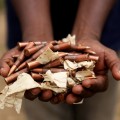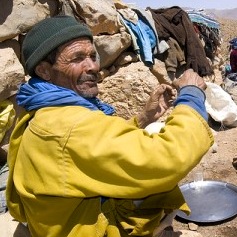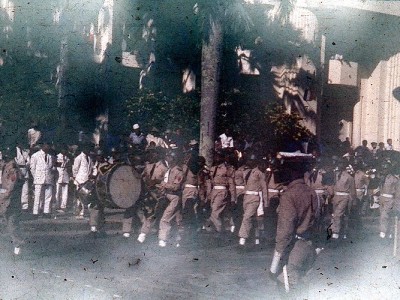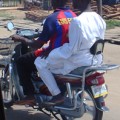Stories about Sub-Saharan Africa from October, 2012
Kenya: The Influence of Technology in Governance
Will Mutua writes about a report investigating the use of Twitter by various presidential candidates ahead of the 2013 national elections: This first report (a mini-report really) investigates Martha Karua’s...
Africa: The Challenges of Building African Platforms
John Karanja discusses the challenges of building African platforms: What is an African platform? What does it look like? and perhaps more importantly what does it do? Will it address...
Chad: President's Plane Botched Landing in Kalait
Blogger Malaika reports [fr] that the plane carrying Chad president Idriss Deby botched its landing in the Kalait region. No one was hurt in the accident. The president was to...
Madagascar: How Much Does a Political Crisis Cost?
Since 2009, an additional 4 millions people now earn less than $1.25/day, 500,000 more children have dropped out of school and 336,000 jobs were lost because of the prolonged political crisis. Blogger...
Mauritania: A glimpse on Nouakchott's 7th Short Film Festival
Organized by the House of Mauritanian Filmmakers, Nouakchott's 7th short film festival kicked off, on the 23rd of October 2012. Ahmed Jeddou compiled some of the reactions to the event.
Guinea-Bissau: Suspected Coup Leader Pansau N'Tchama Captured
Zenaida Machado posted on her twitter feed: “@zenaidamz: #GuineaBissau: Pansau N´Tchama, the man who allegedly plotted Sunday attack to army barracks which killed six, has been captured”
Entrepreneurship, Culture and Solidarity in Africa
Despite strong economic growth, the African continent is still struggling to develop a class of local entrepreneurs to manage strategic industries. Many African scholars and researchers try to better understand the influence of cultural habits on entrepreneurship on the continent.
Gambia: Dramatic Increase in Executions
Nine prisoners were put to death on one day in August 2012. The sudden increase in capital punishment over the last few months as well as confusing declarations from President Jammeh have worried citizens of Gambia as well as those in neighbouring countries. The death penalty was abolished in 1993 but reinstated by Yahya Jammeh one year after the coup of July 1994.
Mauritania: Authorities Hand Over Gaddafi's chief intelligence to Libya
Mauritanian authorities handed over the Gaddafi regime intelligence chief Abdallah Senoussi to Libyan authorities. Ahmed Jedou collects blogger reactions to the development
Ghana: Meet Agnes Chigabatia – Ghanaian Female Politician
There have been considerable efforts by women to have chance in Ghanaian politics. Agnes Chigabatia, a parliamentary candidate and a former member of parliament, is one of them. Ghana Decides, a non-partisan project which aims to foster a better-informed electorate for free, fair and safe 2012 elections using social media tools took a personality profile look on her. She is
Senegal: Casamance Region Hopes for Peace Through Deal in Rome
On October 13 and 14, preliminary talks took place in Rome between representatives of the Senegalese government and of the Movement of Democratic Forces of Casamance (Mfdc). Casamance is a region in the south west of Senegal, which has been the scene of violent conflict between government forces and those fighting for independence since the beginning of the 1980s.
Madagascar: A Case Study for Small Scale Mining
The Artisanal and Small-scale Mining (ASM) in Protected Areas and critical ecosystems (“PACE”) programme (ASM-PACE) has released a case study on how Madagascar can “ensure continued socioeconomic development without undermining ecological...
Mercenaries from Mali to Foment Unrest in Côte d'Ivoire?
A recent United Nations report claims that Côte d'Ivoire’s opposition is recruiting Islamists from Mali to destabilize the Ouattara government. But controversy surrounds the actual status and accuracy of the report’s findings.
African and Caribbean Magazine Thrives in Japan
‘Rendez-Vous en Asie – The Magazine‘ was the first publication of its kind for Africans in Japan, and will celebrate its first anniversary on October 26 in Harajuku, Tokyo.
Former Cricket South Africa CEO Gerald Majola Sacked
Last Friday 19 October, former Cricket South Africa CEO Gerald Majola was dismissed. The move came after a hearing against him found him guilty of accepting bonuses and not declaring among other charges.
On the Challenges of Discussing Precarity in Africa
Despite robust signs of growth in Africa in 2012, precarity remains an ever-present problem right now for the majority of people living there. Inequalities are undoubtedly broadening but the very concept of precarity in Africa is also rapidly evolving.
Madagascar: Preserving National Heritage with Video Archiving
A Civil Society Initiative has been set up to preserve the 'collective memory' of Madagascar by digitally archiving videos detailing its, often controversial, history. The Fl@H Association was set up to preserve Madagascar’s audiovideo heritage and aims to be a force for the preservation of the country’s history. Members can already point to several achievements.
Nigeria: ‘Okada’ Motorbike Taxi Ban Despite Lack of Public Transport
Okada is a local parlance for commercial motorcycle taxis in Nigeria, where public transportation is non-existent, traffic snarls up most cities and potholes mark most roads. However, the Lagos State Government has restricted the operation of these commercial bikes to certain roads - to the riders' dismay.
Benin: Organizing Volunteer Holidays to Share Specific Expertise
Youphil writes [fr] about a project driven by Espace Volontariats du Bénin and supported by France Volontaires that promotes volunteer holidays in Porto Novo and Sô-Ava. The project will help experts...
Cameroon: Students and Researchers Evaluate the Welfare System
Welfare Systems are rapidly evolving in Sub-Saharan Africa, with some countries having implemented systems allowing evaluation of measures taken several decades ago. Students and researchers from Cameroon have closely examined social public policies and private sector initiatives in their country.
Uganda: Getting Ready for the Second Coming of #Kony2012
“I didn’t pay much mind to the #Kony2012 kerfuffle when it first surfaced back in March. I couldn’t be bothered to watch the film and was a bit blasé about...












